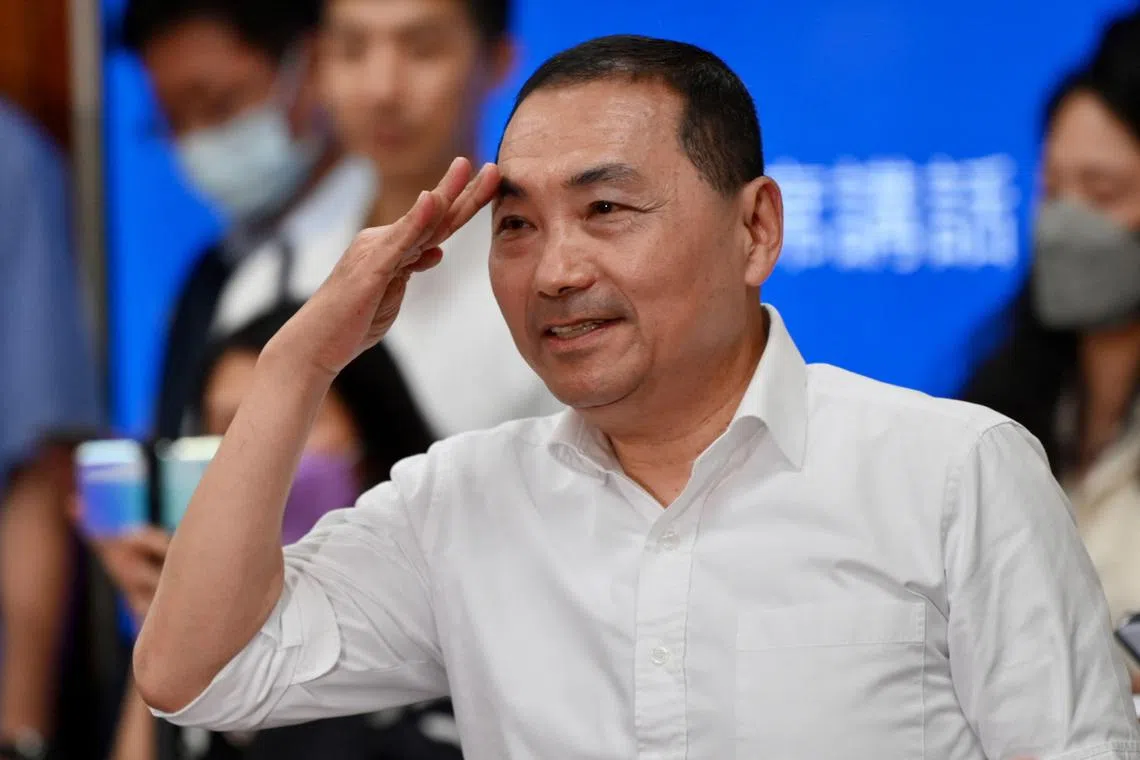Taiwan’s opposition presidential hopeful vows to maintain peace with China, shorten military service
Sign up now: Get insights on Asia's fast-moving developments

Mr Hou Yu-ih rejects the “one country, two systems” formulation that Beijing has said could be used as its model for running Taiwan.
PHOTO: AFP
TAIPEI – A top contender to be Taiwan’s next leader has pledged to keep the peace with China and roll back an extension of mandatory military service that has been one of President Tsai Ing-wen’s main achievements since taking office seven years ago.
“I will ensure stability and peace across the strait before I cut military service back to four months,” said Mr Hou Yu-ih, the opposition Kuomintang’s ( ) candidate for the election set for January 2024.
The ruling Democratic Progressive Party (DPP) was forced to extend the military service to one year because the party made cross-strait relations very tense and dangerous, the current mayor of New Taipei City added in an interview run by local broadcaster TVBS late on Monday.
Ms Tsai’s government announced in late 2022 that it was extending compulsory military service to one year from four months, signalling to Washington and Beijing it is serious about defending itself.
China has pledged to someday reunify Taiwan, by force if necessary. The Biden administration has stepped up weapons sales to Taiwan so that it can defend itself.
Mr Hou said on Monday for the first time that he accepted the tacit understanding between China and the KMT known as the “1992 consensus” that there is just “one China”.
He added that he rejects the “one country, two systems” formulation that Beijing has said could be used as its model for running Taiwan.
Beijing has refused to hold talks with Ms Tsai since she took office because she does not accept that both sides of the Taiwan Strait belong to “one China”. That was the position of her predecessor, Mr Ma Ying-jeou of the KMT, who saw ties flourish with Beijing, including an unprecedented meeting with Chinese President Xi Jinping in 2015.
He also pledged to delay phasing out three nuclear plants and restart a fourth one to ensure stable electricity supplies.
Taiwan Vice-President Lai Ching-te, the ruling DPP’s presidential candidate, said in May that the government was considering keeping nuclear power plants on standby in case of emergencies, signalling a loosening of policy to phase out the energy source.
The island has been seeking to cut coal consumption, putting pressure on the government to build out gas-powered generation and offshore wind to avoid power shortages.
A recent poll indicates that the race to win the election in January 2024 remains close.
The DPP’s Lai was picked by 36.5 per cent of respondents in a survey released on June 20 by Taiwanese Public Opinion Foundation, a non-profit, independent think-tank.
Taiwan People’s Party candidate Ko Wen-je scored 29.1 per cent and the KMT’s Hou got 20.4 per cent. Bloomberg


